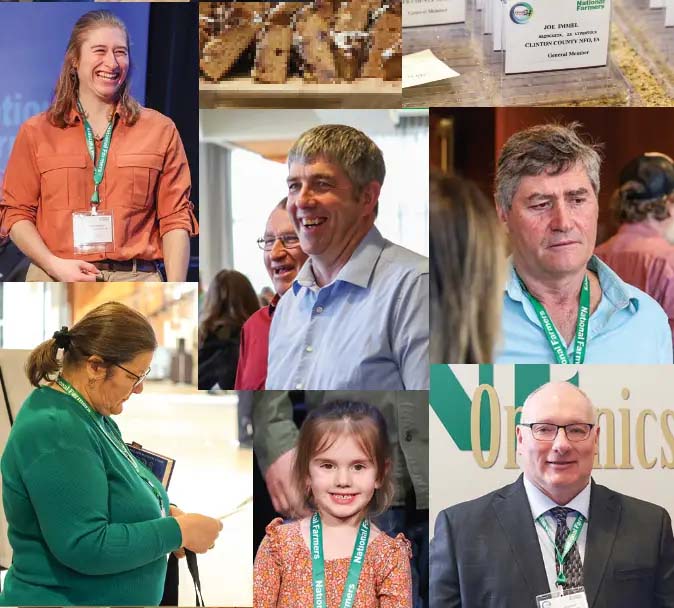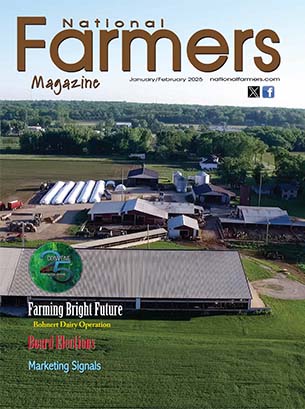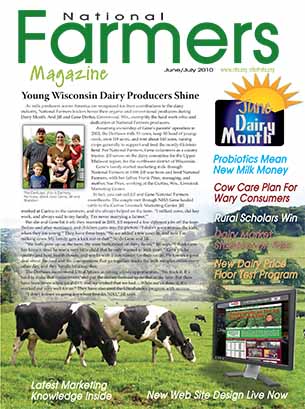National Farmers Convene ‘24 Featured Top-Tier Speakers, Awards and Entertainment
At National Farmers Convene ‘24, highly-regarded speakers spoke about farm topics of keen interest, and awards were presented to high-performing staff and marketing centers in Coralville, Iowa, March 12 and 13.
At the President’s Dessert Reception, Alva and Debbie Heiss received the President’s Award from Paul Olson for their years of service to the organization.

Farm Bill
On the opening day, Dr. Ricardo Salvador, senior scientist and director of the Food and Environment program at the Union of Concerned Scientists, gave convention attendees an update on the Farm Bill.
Salvador believes it is unlikely there will be a new Farm Bill any time soon. “To understand the Farm Bill and where it is going, you need to understand its history,” said Salvador. “The first bill passed in 1933 was an effort to control the boom-bust cycles of the ag market. It didn’t work then and hasn’t worked since.”
There are less than two million family farmers in the country, and many groups have the numbers and political influence to gather support, Salvador noted. Since the early days of the Farm Bill, it has included much more than support for commodity prices. Nutritional programs make up the majority of the bill, supporting 50 million people.
With the pandemic, the rise of food insecurity in the US has become an increasing concern. These mandatory programs funded by the Farm Bill have taken a larger bite of the appropriated monies. It is estimated that the next Farm Bill will require 61 percent more funding than in 2018, totaling an estimated $1.4 trillion.

Improving Soil Health
Improving soil health to help farmers deal with changing climate conditions and carbon intensity was addressed by Carolyn King, vice president, Continuum Ag.
She emphasized the importance of soil armor – protecting soil from wind and water as it moves across the soil, minimizing soil disturbance, plant diversity, living roots, and livestock integration. “There are thousands of pounds of nutrients in the soil that we are unable to access,” King said. But, by improving soil health and ensuring healthy, diverse microbe communities, these nutrients become available to our plants.
King says soil microbes prefer 75 degrees, but that soil temperature is often exceeded. On a day when it is 91 outside, soil covered with a green cover crop can be 76 degrees, while bare soil can read 126. “Reducing chemicals and physical disturbance helps ensure that soil structure remains intact and microbe communities remain healthy,” King said. Once soil structure is disturbed, it holds less water as well as oxygen.
King also spoke about a new carbon intensity program that can help farmers earn more money. As part of the Inflation Reduction Act, a new tax credit, 45z, allows biofuel companies to lower their carbon intensity. This is where farmers come in. If the grain sold to an ethanol or biofuel plant has a lower carbon footprint than normally grown corn, it lowers the biofuel company’s carbon intensity score.
While details are not yet approved, corn grown in 2024 used for biofuel in 2025 is eligible. Farmers will need their practices certified by companies like Continuum Ag and know their corn’s CI score. Farmers then provide the information to the biofuel plant, earning more money per bushel for a lower score corn.
Beef and Dairy Cattle Genomic Testing
Iowa State University (ISU) Extension and Outreach beef program specialist Patrick Wall discussed with convention attendees genomic testing of beef and dairy cattle. Genomic testing can help producers make strategic decisions in selecting cattle that fit their unique programs.
“Producers are never short on challenges, even when prices are good,” Wall noted. Genetic testing, once used primarily in purebred operations, has advanced to the point of being useful in commercial herds and feedlots.
Many economically important traits like calving ease, dry matter intake, feed efficiency, carcass weight, marbling, and tenderness are controlled by multiple genes. Modern genomic testing can predict an animal’s genetic merit and performance at a younger age than traditionally expected progeny difference (EPD) testing.
EPD testing has been around for nearly 40 years, and genomic testing added to EPDs increases cattlemen’s knowledge.
“If you breed replacements, eliminating those animals that are least likely to excel allows producers to concentrate their resources on animals with the most potential,” Wall said. Fertility, calving ease, mature cow weight, milk production, health risks and carcass data can be predicted.
For those feeding cattle, genetic testing can predict performance and product quality. Cattle can be sorted based on predicted information like days-on-feed, growth rate and grade.

National Farmers Grain
Mark Manford addressed the export market, saying while exporting grains helps control supply, lower river levels on the Mississippi and in the Suez Canal has made transportation slower and more costly. This has given Brazilian crops an advantage. In addition, China has been buying corn from Ukraine, taking advantage of lower costs and the area’s unrest.
Theresa Seiler added that the best practice for producers is to be prepared. “Know your cost of production, and act when prices enable a profit.” She recommends producers work together and with National Farmers staff to garner the best price for their grain.
NForganics specialist Mike Schulist spoke optimistically about cooperative marketing and sustainability. Bruce Shultz, who continues to work with Montana red wheat producers and One Mighty Mill in the east, is encouraged by that partnership. “One Mighty Mill is looking for family farmers and promoting their unique story that customers want.” The traceability and year-round demand of this partnership are paying off,” he said.
Al Smith, NF Crop Insurance representative, made beef producers aware that there is livestock insurance available with National Farmers Crop Insurance.

National Farmers Livestock
At Convene ’24 in Coralville, Iowa, National Farmers Livestock Director Pat Lampert and Contract Manager Jeff Rose talked cattle marketing.
Lampert said the cattle on feed report shows lower numbers, so prices have responded favorably recently. While he acknowledged it was a rough few months in the fall, prices have rebounded. Cull cows are selling at record prices.
“If the US cattle herd begins to rebuild with more heifers retained, we should see even better prices since those heifers will not be going to the feed yards,” Lampert noted. The market is strong, however, the red meat supply has remained steady despite the downturn in cattle numbers. In the 50s and 60s steers were slaughtered at 1000, now they are at 1,200 to 1,500 pounds.
Rose called attention to the excellent National Farmers staff members working with customers and have increased the number of those producers hedging their cattle.
National Farmers Dairy
Dairy Division Director Brad Rach moderated the dairy panel during Commodity Day in Coralville, Iowa. Rach said National Farmers has maintained its 18th ranking in the country, despite a tough dairy economy. He said the rank is based on the volume and amount of milk marketed by a Co-op. “The list also shows how many members each Co-op has, and we rank number three,” Rach emphasized. “We are big and we are growing.”
Rach said every five years USDA takes a survey of farmers in the U.S. in order to understand changes in the production industry. In dairy, there were 24,082 producers with off farm milk sales in 2022. In 2017, there were 39,303. “ That was down 40 percent in just a five year period,” Rach said.

Once partnered with National Farmers, they had multiple knowledgeable field staff that could help troubleshoot quality issues, access to office staff that could help file reports, answer questions about the Federal Order or give a different perspective on handling issues. “We have even started co-mingling milk with other groups we don’t market with,” said Ollies.
Jim Hayes, vice president and dairy committee chairman, gave an overview of dairy field staff and how it has evolved the past five decades. 50 years ago there were fewer regulations to track, and the organization only dealt with its own dairy members. But now with partnerships, there is more work for field staff to perform. “It’s more complex today, compared with the 1990s,” he said. Back then farms were closer together, and there was less time spent on the road.
Michael Mackey, director of dairy operations, spoke about the Always Family Farms project and detailed results of a professional consumer survey across 19 states asking if consumers prefer milk sourced from a family farm. Consumer perceptions are that milk coming from family farms is more fresh.
89 percent of consumers believe there is value in buying milk and dairy products from a family farm, even if there are no differences in ingredients or prices compared to dairy produced elsewhere.
When asked if survey respondents would be willing to pay more for certified family farm products, 58 percent said they would pay a 30 percent premium, 72 percent a 20 percent premium and 77 percent would pay a 10 percent premium.
Mackey summarized that the Always Family Farms project is an accreditation program that requires participating dairy processors to guarantee the products they are labeling and distributing originate from a verified and certified family farm.

Corle Entertains
National Farmers Convene ’24 attendees were entertained by songwriter and former dairy farmer Jeff Corle. Corle is a unique combination of a seasoned country songwriter and farmer.
After growing up on the farm, he spent his formative years in Nashville, plying his trade as an outlaw country style singer-songwriter. After experiencing Nashville burn-out, he went back to his roots, returning home to operate his family’s dairy farm in rural western Pennsylvania.
But when economic factors beyond his control forced him to sell his beloved Guernsey cows, he was left heartbroken and despondent. In the midst of his heartache and pain, he turned to an old friend for comfort – his guitar. In the aftermath of having to say goodbye to the cows, Corle penned what would become his first viral hit, Empty Barn.
Corle sang that song and others while telling the stories about his transition from musician back to dairy farmer back to songwriter and YouTube/TikTok sensation. His heartwarming stories were appreciated and many in the crowd totally empathized with his story.












